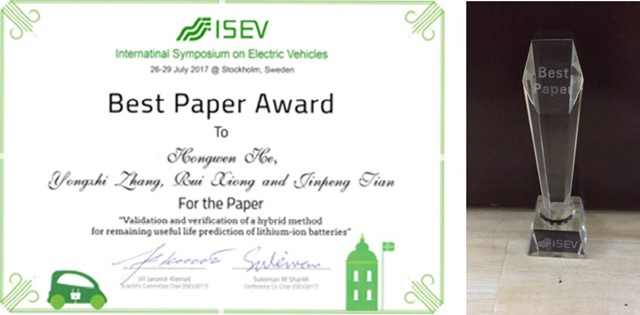Contributed by: School of Mechanical Engineering; Editor: E'Mei

From July 26th to 29th, 2017, at the International Symposium on Electric Vehicles (ISEV2017) International Academic Conference held in Stockholm, Sweden, Professor He Hongwen of the National Engineering Laboratory for Electric Vehicles of the School of Mechanical Engineering of BIT presented the paper “Validation and verification of a hybrid method for remaining useful life prediction of lithium-ion batteries", which won the Best Paper Award and Prof. Suleiman M Sharkhpresented the award.
The ISEV2017 International Academic Conference focuses on cutting-edge technologies and engineering applications for electric vehicles. It is sponsored by the Lund University in Sweden, and is a large-scale international academic conference supported by the Journal of Cleaner Production (IF=5.715), Energy, Ecology and Environment, and Energies (IF=2.262). The theme of the conference covers electronics and motor drive, battery and its management technology, charging system and infrastructure, structural optimization, modeling and simulation, intelligent network connection and driverless technology, norms and standards, policies and regulations on transportation electrification, as well as various fields related to electric vehicles, including regulations, etc. In this ISEV conference, two best papers were finally selected from 240 submissions. In this article, Dr. Zhang Yongzhi, who is instructed by Professor He Hongwen, developed a fusion of a relevance vector machine and a particle filter (PF) for the problem of poor application of data and methods in the prediction of the remaining life of lithium-ion battery. Based on this technology, the battery aging model for building the remaining life prediction can reduce training data by 70%. In addition, the Monte Carlo method is applied to propose a validation model for the algorithm model and serves as a baseline for PF particles. The results show that the method can predict the failure of the battery earlier.
Zhang Yongzhi graduated from Chongqing University in 2013 and is currently a Ph.D student at School of Mechanical Engineering, BIT. In September 2016, he went to the University of Maryland in the United States to develop a joint Ph.D. program for a period of 18 months. The main research direction is electric vehicle battery power, integrated management of energy and durability.
(Reviewed by: Zuo Zhengxing)